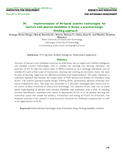| dc.contributor.author | Kirongo, A. C. | |
| dc.contributor.author | Bundi, D. G. | |
| dc.contributor.author | Kitaria, D. T. | |
| dc.contributor.author | Huka, G. S. | |
| dc.contributor.author | Muketha, Geoffrey M. | |
| dc.date.accessioned | 2022-11-22T07:26:41Z | |
| dc.date.available | 2022-11-22T07:26:41Z | |
| dc.date.issued | 2022-06 | |
| dc.identifier.citation | Inaugural MUST International Conference (MUSTIC) on INNOVATION FOR DEVELOPMENT Meru, 28th to 30th June 2022 | en_US |
| dc.identifier.uri | https://journals.must.ac.ke/index.php/AJSTSS/article/view/71 | |
| dc.identifier.uri | http://hdl.handle.net/123456789/6147 | |
| dc.identifier.uri | https://doi.org/10.58506/ajstss.v1i1.71 | |
| dc.description.abstract | Inclusion of Learners with disabilities continues to extensively rely on digital and Artificial Intelligence (AI) enabled Assistive Technologies (AT) as enablers for teaching and learning. However, the provision of ATs to meet the unique needs of PWDs continues to be a challenge. Moreover, such AI enabled ATs exist within areas of innovations, learning and working environments, hence the need for ease of learning, usage and cost effective acquisition and implementation. This paper introduces a systematic approach that matches the unique needs of PwD learners and abilities of innovators using AI-ATs. The research approach applies Design Thinking (DM), participatory elements enhanced with online collaborative tools. The study was conducted in 3 physically challenged pilot schools and an AT Centre at Meru University of science and technology. The objective of the study was to create better understanding of learners with physical disabilities and innovators with a view of enabling accurate identification, evaluation and choice of appropriate AI-ATs so as to develop learning and innovation spaces that enable the creation, introduction and testing of AI-ATs for e-inclusion. The expected outcome of this research is socio-economic inclusivity for livelihood empowerment as well as de-stigmatization of PwDs. | en_US |
| dc.language.iso | en | en_US |
| dc.publisher | African Journal of Science, Technology and Social Sciences (AJSTSS) | en_US |
| dc.subject | AI-based Assistive Technologies, Areas of Innovation, Design Thinking, Disabilities, eInclusion | en_US |
| dc.title | Implementation of AI-based assistive technologies for learners with physical disabilities in Kenya: a practical design thinking approach | en_US |
| dc.type | Article | en_US |

